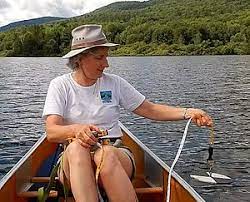Angela Shambaugh is a long-time aquatic biologist who until October 2020 worked for Department of Environmental Conservation (DEC) within the Agency of Natural Resources (ANR). After reading Bob Popp’s recent comments to the ANR recommending a total wake boat ban on Vermont’s inland lakes and ponds, Angela was inspired to write her own piece. In it she expresses her opinion as a professional, concluding that the ANR’s current weak draft rule of a 500-foot minimum distance from shore is insufficient. Instead, Angela recommends a stronger rule in which “a 1000-ft buffer should be the bare minimum.”
Angela led the DEC’s cyanobacteria monitoring program from its inception in 2003 to her retirement in 2020. She played a key role in laboratory analyses, cyanobacteria assessments, water sampling, and community outreach. Angela’s work was a critical factor in bringing national recognition for Vermont’s ongoing cyanobacteria monitoring program.

Angela Shambaugh, retired ANR/DEC aquatic biologist, checking water transparency (DEC photo).
Here are Angle’s comments:
“Recently, Bob Popp wrote an excellent piece on why it’s important to regulate the use of wake boats on Vermont’s waters. I’d like to chime in with a few more thoughts.
As a kayaker, nature watcher, and aquatic biologist, I’ve been to many lakes around the US and elsewhere. I know personally, and the data show, that Vermont has some of the best lakes in the country with respect to water quality and recreation. Let’s keep it that way.
The operation of wake boats on small waterbodies is inconsistent with the State of Vermont’s responsibility to protect and maintain the natural condition and biology of these lakes. As Bob noted, wake boats are likely to cause severe erosion and damage aquatic habitats. Their ballast tanks also make it more difficult to prevent AIS transport. These boats do not belong on our small lakes.
Vermont wishes to be an outdoor recreation destination. With that goal comes the responsibility to make sure that the very places valued by outdoor enthusiasts are not damaged by the increased activity. There must be places for motorized and non-motorized water-based recreation that support the expectations of both user groups. The use of non-motorized and smaller motorized boats should take priority on small lakes. A similar lake-by-lake approach was developed for jet skis in the past and can be used in this case too.
It is not possible for all lakes to be used by all possible water sports without conflict or ecological consequences. While the proposed depth requirements and a 1000 ft. buffer should be the bare minimum, I would like to see us go further and truly protect our small lakes. I agree with Bob Popp – keep wake boats on Vermont’s largest lakes – Memphremagog and Champlain. They provide adequate buffer distances and depth to minimize ecological impacts of wake boat operation. They have the space to reduce conflict between different recreational uses. The infrastructure for enforcement of operating rules and management is already in place. Limit wake boat use to those large lakes and protect Vermont’s small water bodies.
Angela Shambaugh, retired aquatic state biologist”
………………
IMPORTANT ADDENDUM:
We received so many enthusiastic, positive comments about the powerful Last Wilderness Alliance video (“Wake Surfing – A Threat to Our Lakes“) included in December 4’s Newsletter that we include it again here: https://www.youtube.com/watch?v=2OEHn0Htj8A. In the words of one viewer: “It needs to be shown to the Vt. legislature!”. If you have not seen this 6.5-minute video, we strongly encourage you to do so now. It provides a graphic explanation of why our Responsible Wakes strong rule for wake sports includes a minimum distance from shore of 1,000 feet and a minimum water depth of 20 feet. If you watch only one video about the dangers of wake boats to our lakes, this should be the one.
If you have a story of your own to share … or an idea for a Newsletter you would like to see, please write to us at info@responsiblewakes.org.
